Key takeaways:
- Religious education encourages personal exploration of beliefs and fosters critical thinking through dialogue and diverse perspectives.
- Volunteering enhances learning experiences, emphasizing the mutual growth of volunteers and students and the importance of addressing emotional and educational needs.
- Ethical volunteering requires respecting community dignity, maintaining transparency, and managing one’s resources effectively to make a meaningful impact.
- Empathy, patience, and collaboration emerge as essential lessons learned through volunteering, transforming individual perspectives and enhancing community relationships.
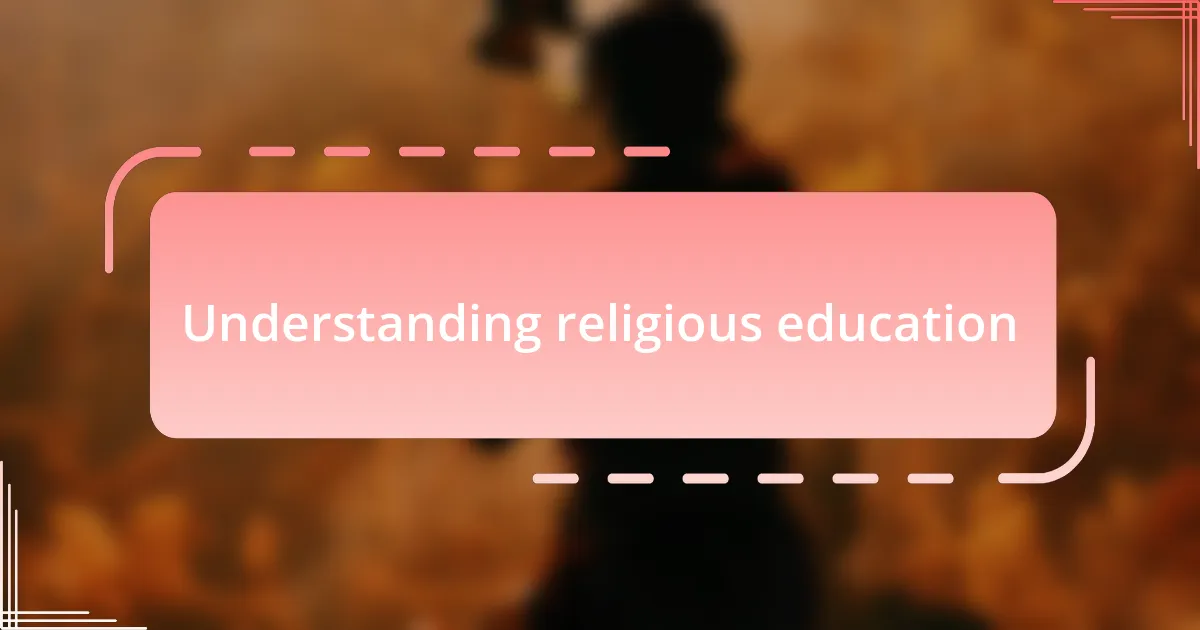
Understanding religious education
Religious education goes beyond mere doctrine; it encourages a deep exploration of beliefs, morals, and values. I remember a time in a discussion group, where we shared personal stories linked to our faith. This opened my eyes to how diverse interpretations shape our understanding and compassion toward one another.
It’s fascinating how religious education can challenge us to reflect on ethical dilemmas we face in everyday life. Have you ever questioned what your beliefs would prompt you to do in a difficult situation? I found myself grappling with this during a community service project, where the teachings I received guided my actions and enriched my moral compass.
Moreover, religious education fosters critical thinking by inviting students to engage with different perspectives. I recall an enlightening session where we analyzed various texts, leading to a debate that made us reconsider our preconceived notions. This experience taught me that understanding religion isn’t just about acceptance; it’s about dialogue and growth.
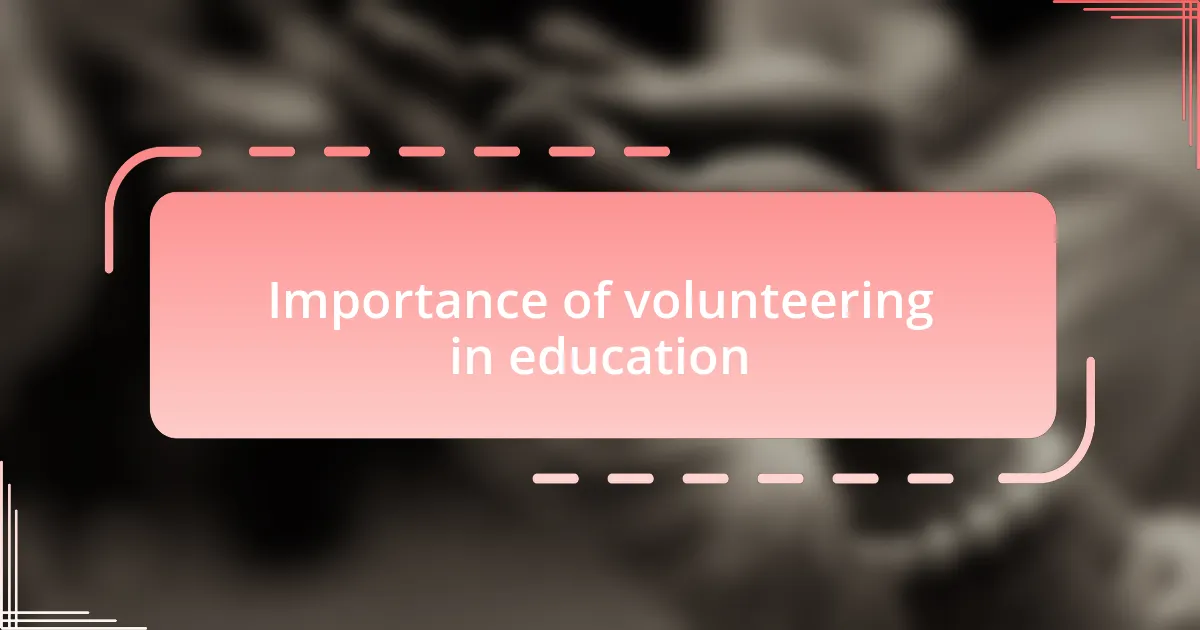
Importance of volunteering in education
Volunteering in education plays a vital role in enhancing students’ learning experiences. From my time helping at a local tutoring center, I noticed how every tutoring session not only benefited the students but also ignited my passion for teaching and mentorship. It made me wonder: how often do we miss opportunities to learn from those we aim to educate?
When I volunteered during a summer camp, the joy on the children’s faces when they grasped a difficult concept reinforced my belief that volunteering transcends simple acts of service. Each lesson taught was a chance for connection, bridging gaps between knowledge and understanding. Have you ever felt that rush of excitement when you see a light bulb go off in someone’s mind? It reminded me that education is a two-way street, where both the volunteer and the learner grow profoundly.
Moreover, engaging directly with students in a volunteer capacity allows us to understand the unique challenges they face. I remember one student opening up about his struggles with self-esteem, which made me realize that education is not just about academics; it’s also about nurturing the child’s spirit. Isn’t it inspiring to think that through volunteering, we can offer support that extends beyond the classroom? These experiences have undeniably shaped my perspective on the intertwined nature of ethics, education, and community involvement.
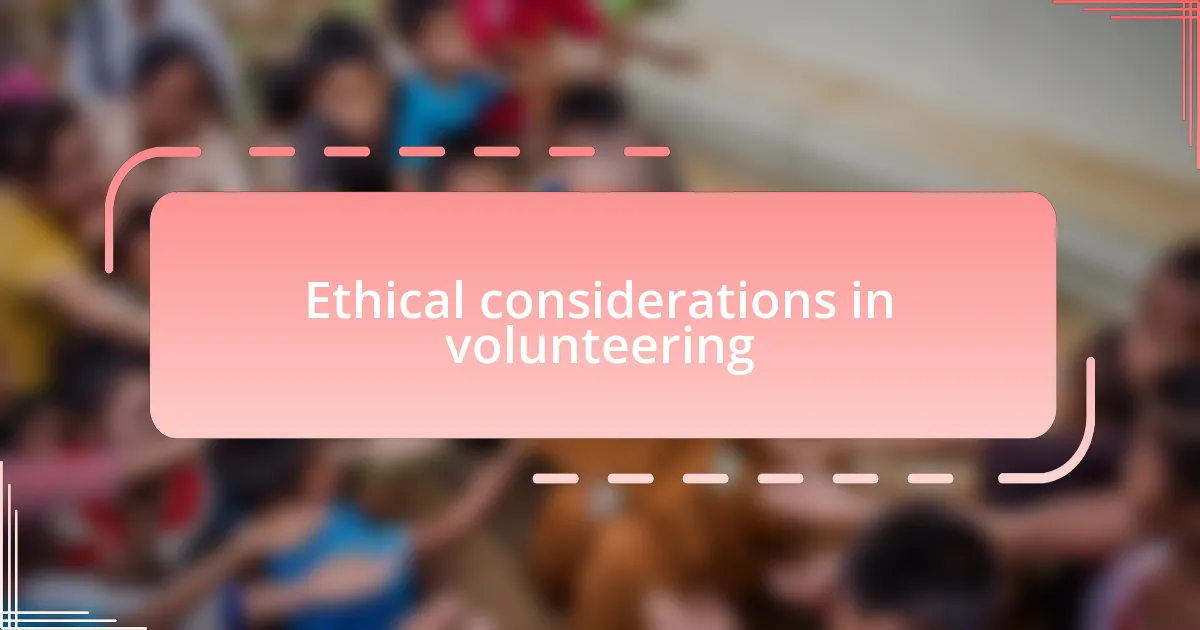
Ethical considerations in volunteering
Ethical considerations in volunteering extend beyond just the act of service; they involve a deep respect for the communities we engage with. I recall volunteering at a shelter where I quickly learned that listening was just as important as providing assistance. I often wondered, how do we ensure that our help doesn’t inadvertently undermine the dignity of those we aim to support? It was a powerful reminder that our intentions must align with the needs and perspectives of the individuals we serve.
Another critical element is transparency. During my time volunteering with a local organization, we often discussed our goals openly with the community members. This practice fostered trust and empowered individuals to voice their needs. Have you ever considered how vital it is to create an environment where beneficiaries feel comfortable sharing their thoughts? This exchange not only enriched our programs but also ensured that we were addressing genuine issues rather than making assumptions.
Furthermore, there’s an ethical responsibility to manage our time and resources wisely. I once committed to a long-term project without fully assessing my capabilities, which ultimately stretched me thin and affected the quality of my involvement. It’s essential to ask ourselves, are we genuinely able to contribute, or are we overextending ourselves? Reflecting on this allowed me to recognize that ethical volunteering means knowing our limits while still striving to make a meaningful impact.
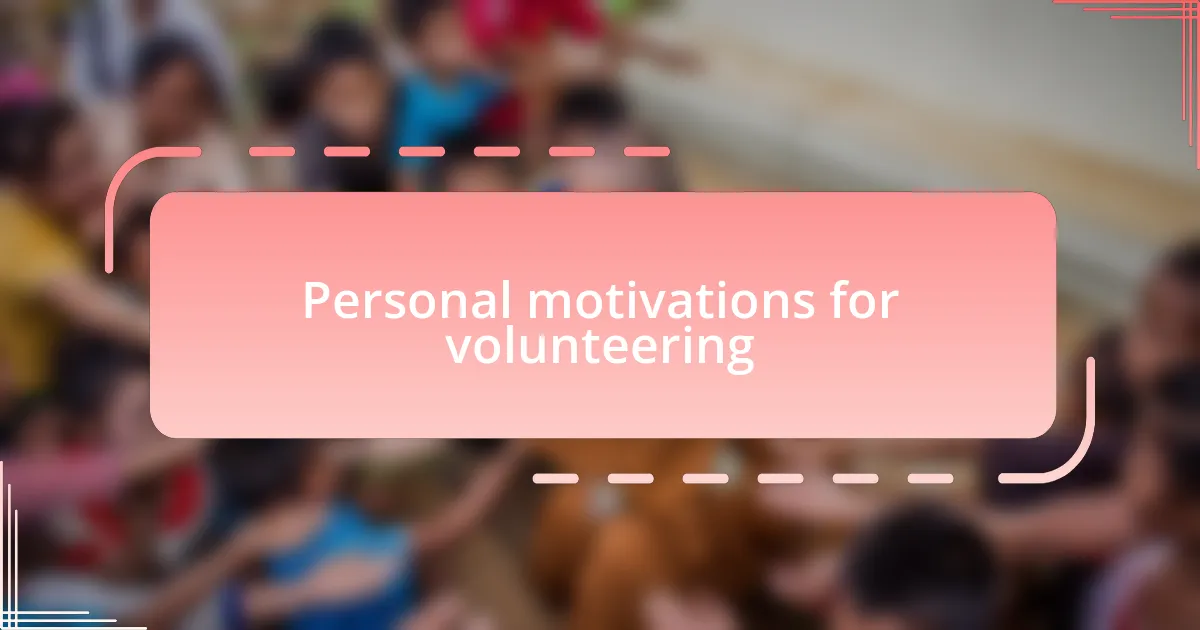
Personal motivations for volunteering
Many of my personal motivations for volunteering stem from a desire to connect with others and make a difference in their lives. I remember my first experience at a community garden—seeing how a simple act of planting could bring people together from diverse backgrounds was incredibly fulfilling. It made me think, what if we all contributed a little of ourselves to help others flourish?
Another driving force for me has been the opportunity for personal growth. Volunteering often pushes me out of my comfort zone. I once led a workshop for at-risk youth, and I was terrified. But in facing that fear, I not only gained confidence but realized the impact I could have by sharing my knowledge. Isn’t it remarkable how much we can learn about ourselves while helping others?
Lastly, the values instilled in me through my upbringing play a significant role in my motivation. My faith has taught me the importance of serving others, and each time I volunteer, I feel a sense of purpose. It raises the question: how often do we allow our core values to guide our actions? For me, answering that question brings a sense of alignment between what I believe and how I live my life.
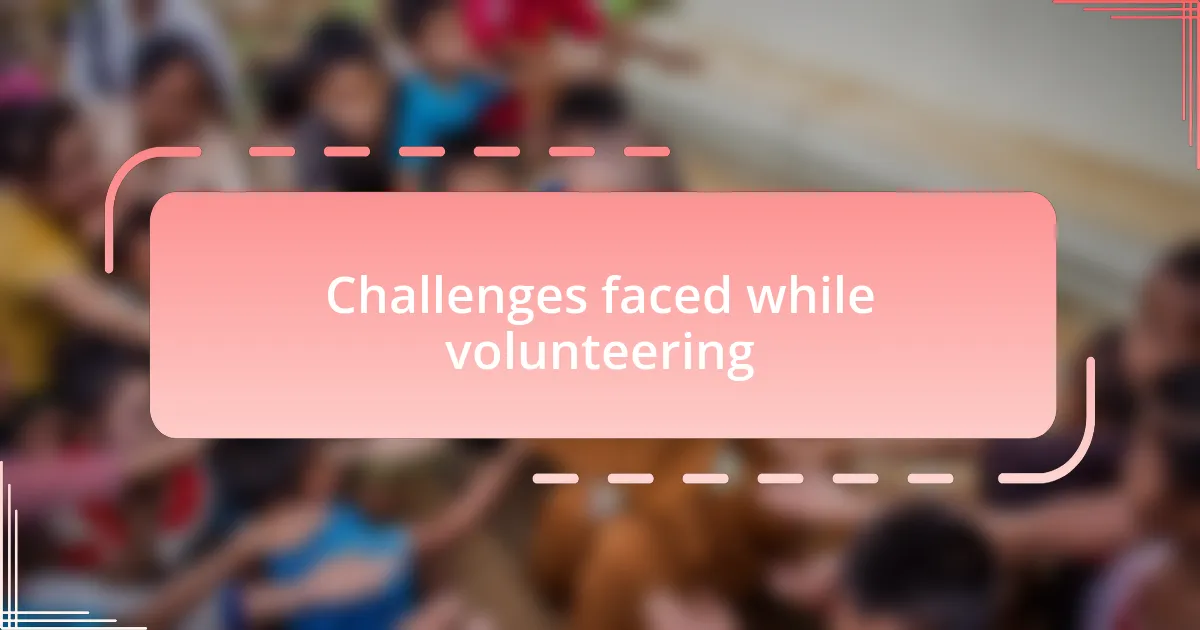
Challenges faced while volunteering
Volunteering often brings unexpected challenges that can test our resolve and commitment. I recall a time when I volunteered at a local shelter, and the emotional baggage of the individuals I encountered weighed heavily on me. It made me question how much I could truly handle while still offering them the support they needed.
Another obstacle I faced was logistical issues. While organizing a fundraiser, I navigated through conflicts in schedules and managed to find volunteers who were willing to step up. I often felt overwhelmed, wondering how to balance my time and energy while still meeting the needs of the community. This experience highlighted the importance of adaptability—how do we respond to obstacles without losing sight of our goals?
Communication can also be a significant hurdle in volunteer settings. I remember trying to coordinate with different teams during a community outreach event, and misinterpretations led to confusion. It made me reflect on the power of clear dialogue and trust. How many times do we assume everyone is on the same page? Through these experiences, I realized that open communication is vital for effective collaboration and achieving our collective mission.
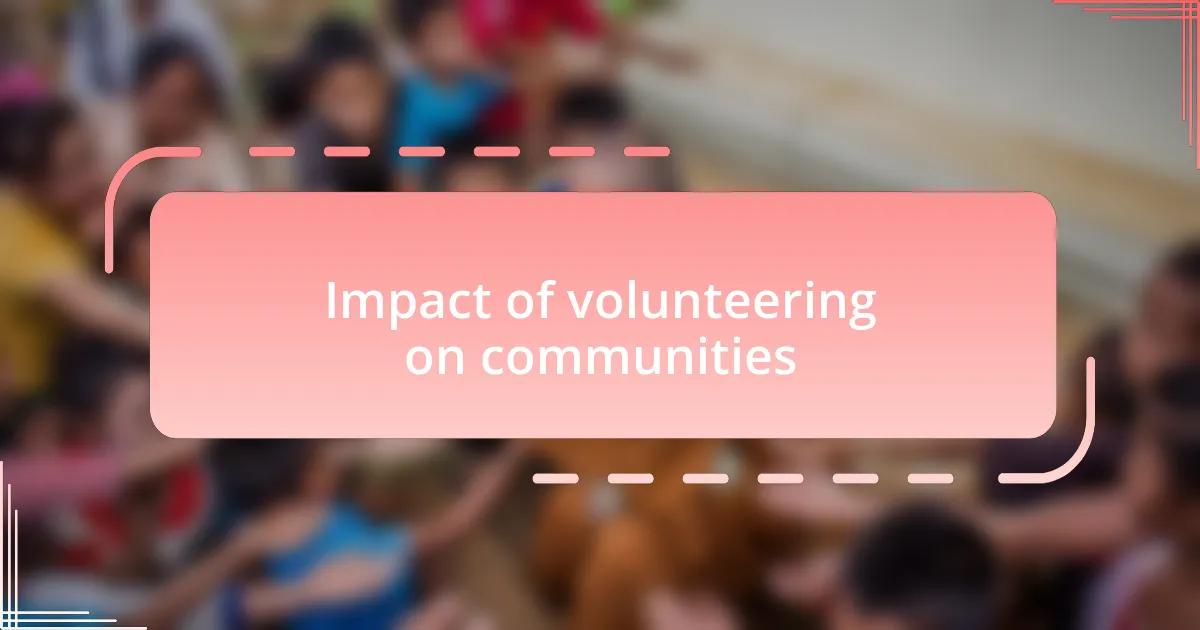
Impact of volunteering on communities
Volunteering can create a ripple effect in communities, inspiring unity and collaboration. I vividly remember the time I participated in a neighborhood clean-up initiative. As we picked up litter and painted over graffiti, I felt a powerful sense of belonging among my neighbors. It made me think: can small acts of service really change perceptions and attitudes within a community? Absolutely.
The impact of volunteering extends beyond surface-level improvements; it can foster long-lasting change. During a mentoring program for youth, I developed close relationships with several participants. Witnessing their growth and confidence blossoming firsthand became one of my proudest moments. Isn’t it incredible how investing time in others can lead to a transformative journey for both the volunteer and the beneficiary?
Moreover, volunteering can unveil hidden talents and strengths in individuals. I recall attending a workshop that encouraged us to share our skills in creative writing. This experience not only empowered others to express themselves but also bolstered my own confidence as I watched my peers shine. How often do we underestimate our own abilities while uplifting the community around us? Volunteering opens doors to discover those hidden gems.

Lessons learned from my experience
Through my volunteering experiences, one of the most significant lessons I learned is the importance of empathy. I vividly recall volunteering at a local soup kitchen, where I served meals to people from diverse backgrounds. As I conversed with them, I realized that everyone has a story, and understanding those stories can break down barriers. Isn’t it fascinating how empathy can transform not only our relationships but also our perspectives on life?
Another crucial insight I gained was the value of patience. During a tutoring program, I often worked with children who struggled to grasp basic math concepts. At times, I felt frustrated, but with every setback, I learned that taking the time to explain things in a different way made all the difference. It made me reflect: how can we cultivate patience in our daily lives when faced with challenges?
Finally, I learned about the power of collaboration. While working on a community garden project, we faced numerous obstacles, from weather conditions to differing opinions about plant choices. However, navigating those challenges together not only strengthened our teamwork but also deepened our collective commitment to the project. This experience prompted me to ask, how can we leverage collaboration in our other endeavors to achieve greater outcomes?